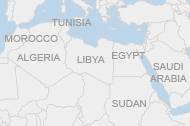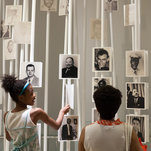BEIRUT, Lebanon — Security forces in Bahrain used excessive force, including torture and the extraction of forced confessions, against detainees who were arrested in a sweeping crackdown early this year during protests that deeply polarized the country, according to a report by an independent commission that investigated the uprising and its aftermath.
Torture Used on Protesters in Bahrain, Report Says

A protester ran from tear gas fired by riot police on Wednesday in A'ali, Bahrain. More Photos »
By NADA BAKRI
Published: November 23, 2011
Multimedia
Related
-
Bahrain Is Nervously Awaiting Report on Its Forgotten Revolt (November 22, 2011)
Connect With Us on Twitter
Follow @nytimesworld for international breaking news and headlines.
Andrea Bruce for The New York Times
Women joined in demonstrations in February in Manama, Bahrain, that called for political change. A commission says the government used excessive force to suppress the movement. More Photos »
The report, released on Wednesday, presented a devastating portrait of what it called disproportionate and indiscriminate force often used by the security forces to repress protests in February and March that were organized primarily by the Shiite Muslim majority in Bahrain, a tiny Persian Gulf state that is a prominent American ally.
“A number of detainees were tortured,” M. Cherif Bassiouni, an international law expert who led the inquiry, said at a news conference in Manama, the capital, as King Hamad bin Isa Al Khalifa listened. Mr. Bassiouni added that the dimensions of the torture “proved there was a deliberate practice by some.”
The protesters began by calling for a more equitable political system, including a constitutional monarchy. But as the violence escalated, some demonstrators demanded the dismantling of the political structure, and the Sunni monarchy at times appeared to fear that the family that had conquered Bahrain in the 18th century was about to be overthrown.
The report by the panel, known as the Bahrain Independent Commission of Inquiry, also said there was no clear evidence that Iran had incited the unrest, as senior Bahraini officials have contended. And it determined that troops from neighboring Persian Gulf countries, led by Saudi Arabia, that intervened during the crisis in Bahrain did not violate human rights.
In Washington, the Obama administration welcomed the report, but said the onus was now on Bahrain’s government to hold accountable those responsible for abuses and to undertake reforms to make sure they do not occur again.
Based on more than 5,000 interviews with protesters, Bahrain residents and foreigners, the inquiry represents perhaps the most comprehensive look at any of the uprisings and crackdowns that have roiled the Arab world this year. In its sheer breadth — it runs to 489 pages — the report appeared to mark a first for the Arab world, pulling the shroud back from the inner workings of secretive security forces.
King Hamad commissioned the report from an independent panel that he appointed in the summer to investigate the protests and crackdown; all members of the commission are internationally recognized in their fields. The results had been eagerly anticipated by both the nation’s Shiites, who represent about 70 percent of the population, and the ruling Sunni minority.
The commission found that Bahrain’s security services and Interior Ministry “followed a systematic practice of physical and psychological mistreatment, which amounted in many cases to torture, with respect to a large number of detainees.”
In the report, the panel called the government’s use of force and firearms excessive and, “on many occasions, unnecessary, disproportionate and indiscriminate.” It cited instances in which masked men broke into the homes of dissidents between 1 a.m. and 3 a.m., “terrorizing” inhabitants.
The inquiry determined that 35 people died during the protests, including five security personnel. Five detainees were tortured to death while in custody, the panel concluded, and other detainees endured electric shocks and were beaten with rubber hoses and wires. Hundreds of people were also injured.
A total of 2,929 people were arrested during the protests, the report said, and at least 700 remain in prison. The commission urged a review of the sentences handed down to protesters.
The commission also determined that Shiites were not the only victims of violence and intimidation: it said that Sunni Muslims were targets for humiliation, physical assaults and attacks against their property.
The king, speaking during the televised news conference, said that officials who engaged in abuses during the crackdown would be held accountable and replaced. He pointedly cited wrongs, although he portrayed them as having been committed by both sides.
And despite the commission’s conclusion that Iran did not play a role in the uprising, the king again insisted that Iran, a Shiite majority nation, had incited the unrest in Bahrain.
- 1
- 2
This article has been revised to reflect the following correction:
Correction: November 24, 2011
An earlier version of this article referred incorrectly to Bahrain’s monarch in one reference. He is King Hamad, not King Khalifa.












